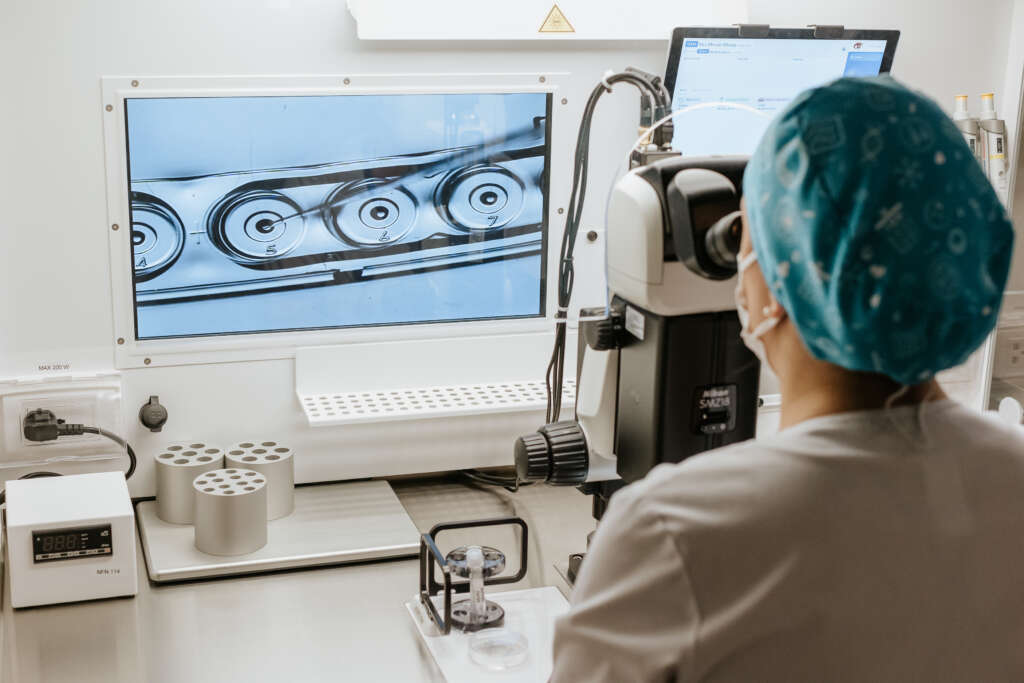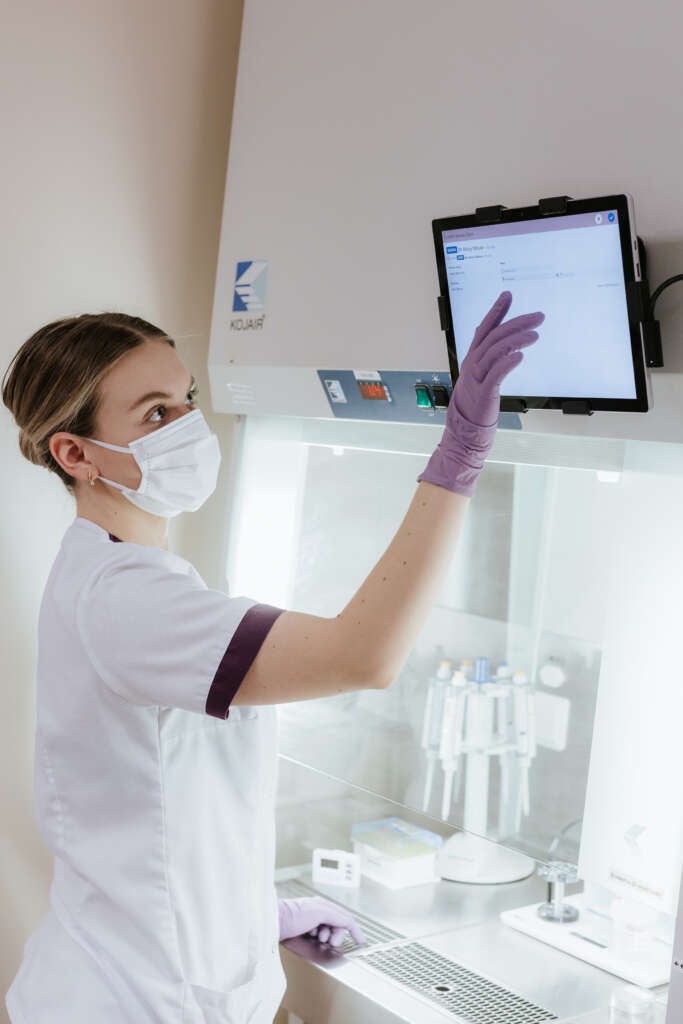11th of February is International Day of Women and Girls in Science. Next Fertility Nordic’s Embryology team answer some intriguing questions about being women in S.T.E.M.
What role do Embryologists play in a fertility clinic?
Samantha: The IVF lab is active 7 days a week. You need the right people in the right place at the right time.
At the start of the day: We set up the lab by getting out necessary supplies, turning equipment on and checking quality control.
In the morning: We perform oocyte pick-ups as well as fertilization assessment, embryo gradings and blastocyst selection.
Late morning: We strip and freeze oocytes and thaw embryos for later transfer or thaw donor eggs for later insemination.
Throughout the day: We prepare sperm for treatment (IUI/IVF/ICSI), perform diagnostic semen analyses, and sometimes sperm freezing.
Around lunchtime: We perform the fertilization (ICSI/IVF) by combining eggs and sperm under the microscope.
In the afternoon: We perform embryo biopsies, embryo transfers and embryo freezing.
At the end of the day: We prepare protocols, labels, dishes and media for the next day and clean the lab.

Data entry occurs in the Embryologist’s office; we add cycle data into medical databases, prepare reports, create storage contracts, organize imports or exports of reproductive material and record results for statistical purposes. Coordinating with other clinic members, planning, ordering supplies, answering emails/phone calls, and taking meetings happens in the background.
Embryologists do have a small amount of patient contact. They take microscopic observations and portray them in an understandable manner. Nonetheless, they are generally considered more ‘behind the scenes’ in the clinic. Therefore, patients may not realize the impact Embryologists have on their treatment. You can’t make embryos without Embryologists. It is a real combined effort of the medical and the lab team to produce positive outcomes.

Why did you choose a career path in Clinical Science / Embryology?
Merli: After high school I was unsure what to study further. As Chemistry was my favorite subject, I opted for that. During and after my master’s degree, I worked in a scientific lab, but it was not easy to see the meaning and outcome of my work.
Therefore, when an opportunity arose to work in an IVF lab, I took this without much hesitation. Helping people, doing something practical and seeing a result of my work is important for me and being an Embryologist covers these aspects.
What education/training did you undertake?
Yolanda: My education started with a bachelor’s degree in Human Biology and even during undergraduate studies, I managed to receive practical training in an IVF and Andrology laboratory via an internship.
Later in my master’s degree in Biotechnology of Human Assisted Reproduction, I focused on human infertility, reproductive techniques, and methods of research. It allowed me the opportunity to intern at a large IVF facility which helped me to develop my thesis. Shortly thereafter I was able to work as an Embryologist. I supplemented my knowledge through professional courses. For example, I had specialized training in PGT which enabled me to perform trophectoderm embryo biopsy and sample loading in a clinical setting.
How do you stay up to date with the latest advancements in IVF?
Galina: Our line of work is continually evolving and growing so keeping up with scientific research is important. Several times a year I participate in seminars and scientific conferences where the newest advancements and discoveries are presented by experts in the field.
The best way to learn something new is of course having hands-on training. There are constantly new products and technologies on the market. The only way to determine if a technology is useful in your clinic, is to try it and decide for yourself.

How do you handle uncertainty, given that many couples are dealing with infertility?
Samantha: It is hard not to feel partly responsible when something doesn’t quite go to plan. However, IVF is still a science which can be unpredictable. When cycles are successful, you can pick yourself back up by giving yourself credit for the part you played.
Keeping patients at the back of your mind in your decision-making, as if you were handling your own cells, is a good way to remind yourself that you did the best you could.
What are some differences/changes you have seen over the last 15 years within the field?
Merli: 15 years ago, the freezing technique of embryos was much different. We used a slow freezing method which took over 2 hours and had low survival rates. Now the vitrification method is used which takes 15 minutes and has high survival rates.
There were no printable labels, so we wrote on the dishes and straws with marker pen. Almost all embryo transfers and freezing were on day 2 of embryo development, but now there is a bigger push towards blastocyst culture. A big step forward is the opportunity for time-lapse incubation which enables constant embryo surveillance, instead of seeing only snapshots, which was the only option back then.
What is the most challenging aspect of being an Embryologist?
Galina: Probably feeling pressure to get the best outcomes for every single patient and feeling powerless when nature takes its course. Often, we learn about the reproductive history of the patients, particularly in cases with repeat failures or pregnancy losses.
We remember patients too (and not just their cells!). In these circumstances, it is even harder to process bad news. Moreover, the job requires constant focus and meticulous attention to detail. For these reasons it can also be stressful.
Has the increased focus on genetics impacted the clinical treatment of infertility?
Yolanda: There has been an enhancement in the understanding of genetic factors influencing fertility and reproductive outcomes. When you see the results yourself in research papers and PGT reports, you can’t ignore the enormous impact maternal age has on both the risk of miscarriage and the likelihood of embryos having genetic abnormalities, yet not every clinic offers genetic testing.
As an Embryologist with an interest in genetics, I recommend embryo assessment for genetic abnormalities because you have the potential to reduce the number of failed embryo transfers and increase the chance of a successful pregnancy. Incorporating genetics into embryology is very rewarding especially if we can achieve higher rates of healthy babies being born.

